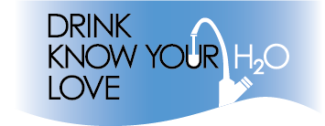About Your Water Quality
Every time a water faucet is turned on and clean, safe drinking water is available, we experience the success of local, state, and national drinking water protection efforts.
Ensuring that drinking water is clean and safe is one of the core functions of the Rhode Island Department of Health. Rhode Island tap water undergoes rigorous and frequent testing to maintain the high standards required by the Safe Drinking Water Act.

Make a pledge to:
- Drink more tap water whenever you reach for refreshment;
- Use a refill station whenever one is available;
- Carry your own reusable bottle. Lined aluminum, glass, or stainless steel are convenient and affordable; and
- Urge friends and family, favorite restaurants, employers, and communities to support the work of their local water suppliers.
Know Your H2O
You should know that your water is safe to drink. Community water suppliers are responsible for providing an annual water quality report known as the Consumer Confidence Report. These reports can be requested directly from your water supplier. Large water suppliers also make the reports available on their websites (see below).
Owners of private wells are responsible for making sure their home water supply is safe to drink.
The Center for Drinking Water Quality and the University of Rhode Island have conducted assessments of the sources of public water supplies in the state. Summaries of these assessments are useful to describe the geology and watershed for particular water systems. Assessments were first conducted in 2003 and are being gradually refreshed.
- Abbey Lane Community Association
- Alpine Nursing Home
- Bethel Village Water Associations
- Block Island Water Company
- Blueberry Heights Housing Coop
- Bristol County Water Authority
- Camp-e-huntee
- Canonchet Clissf Water Association
- Castle Rock Condominiums
- Chimera Inc
- Cumberland, Lincoln, Pawtucket
- Eleanor Slater Hospital Zambarano
- Four Seasons Mobile Home Coop
- Glendale Association
- Harmony Hill School
- Harrisville Fire and Water District
- Hebert Nursing Home
- Foster Senior Housing, FKA Hemlock Village
- Hillsdale Housing Coop
- Charlestown Cedars LLC, FKA Indian Cedar Mobile Home Park
- Jamestown Water Dept
- Kent County Water Authority
- Laurel Crest Glocester Housing
- Lindhbrook Water Company
- Maplehill Mobile Home Park
- Meadowlark, Inc
- Mobile Village Park Inc
- Rocky Ridge Realty LLC, FKA Nancy Ann Nursing Home
- Nasonville Water District
- Ninigret Realty
- North Kingstown
- Paige Associates, FKA Woodland
- Prudence Island Water District
- Richmond Water Supply
- Jemp 1 LLC, FKA Scituate Commons
- Scituate Reservoir
- Shady Harbor Fire District
- Shannock Water District
- Slatersville Public Supply
- South Kingstown Nursing and Rehab
- South Kingstown
- Split Rock Corp
- Tiverton,Little Compton
- Touisset Point Water Trust
- Westerly Water Dept
- Pine Acres ALR, FKA Woodpecker Hill Nursing Home
- Woonsocket Water Dept
Additional source water protection resources are available at the University of Rhode Island's web page on Source Water Assessments.
Assessments for Non-Community Public Water Systems are available from RIDOH by calling (401)222-6867.
Most people do not understand where their water comes from, how their drinking water is monitored, or that monitoring results are public knowledge. The Water System Information (Drinking Water Viewer) web portal allows citizens and water suppliers to see drinking water monitoring data and other information for public water systems in Rhode Island.
Love Your H2O
What You Can Do
Water conservation is the most cost-effective and environmentally sound way to reduce our demand for water. RIDOH and the URI Cooperative Extension have developed the Drinking Water Protection Resource Center to help make customers aware of the threats to their drinking water and to explain how to help protect drinking water supplies.
Health Benefits
Getting enough water every day is important for your health. Drinking water when thirsty and drinking water with meals helps to ensure our bodies are replenished and healthy. Water helps your body:
- Maintain your normal temperature;
- Lubricate and cushion joints;
- Protect your spinal cord and other sensitive tissues;
- Get rid of wastes;
- Prevent, and even reverse, tooth decay.
Nearly all naturally occurring water sources contain fluoride—a mineral that has been proven to prevent, and even reverse, tooth decay. Community water fluoridation is a widely accepted practice for preventing and controlling tooth decay by adjusting the concentration of fluoride in the public water supply; more Private well owners should have their water tested regularly to determine the level of naturally occurring fluoride.
More
- Large Water Suppliers Websites:
- Bristol County Water Authority
- Cumberland Water Department
- East Providence
- Newport Water Department
- North Kingstown Water Department
- Pawtucket Water Supply Board
- Portsmouth Water and Fire District
- Providence Water Supply Board
- United Water Rhode Island (Wakefield Water)
- Westerly
- Woonsocket Water
- Water Use it Wisely
- Information about Public Water Systems
- Public Water System FAQ's
- Water Use it Wisely
- Information about Public Water Systems
- Public Water System FAQ's
